4PS204 Judgment and Decision-Making: Stress Impact Research Proposal
VerifiedAdded on 2022/08/27
|17
|4581
|17
Project
AI Summary
This research proposal investigates the impact of stress on the decision-making abilities of managers in small-scale enterprises. The proposal includes an introduction defining stress and its presence in the business world, followed by a problem statement highlighting gaps in existing literature regarding stress's specific impact on managerial decisions. The research objectives aim to understand this impact and identify potential stress management techniques. Research questions explore the nature of stress's influence and control methods, with two hypotheses positing both positive and negative impacts. A literature review synthesizes existing research on related topics, such as religiosity in decision-making, environmental factors, and clinical training. The methodology section details the research philosophy, design, data collection, sample population, sampling technique, ethical considerations, study purpose, and limitations. The proposal aims to contribute valuable insights into how stress affects managerial decisions and offers potential solutions for mitigating its negative effects.
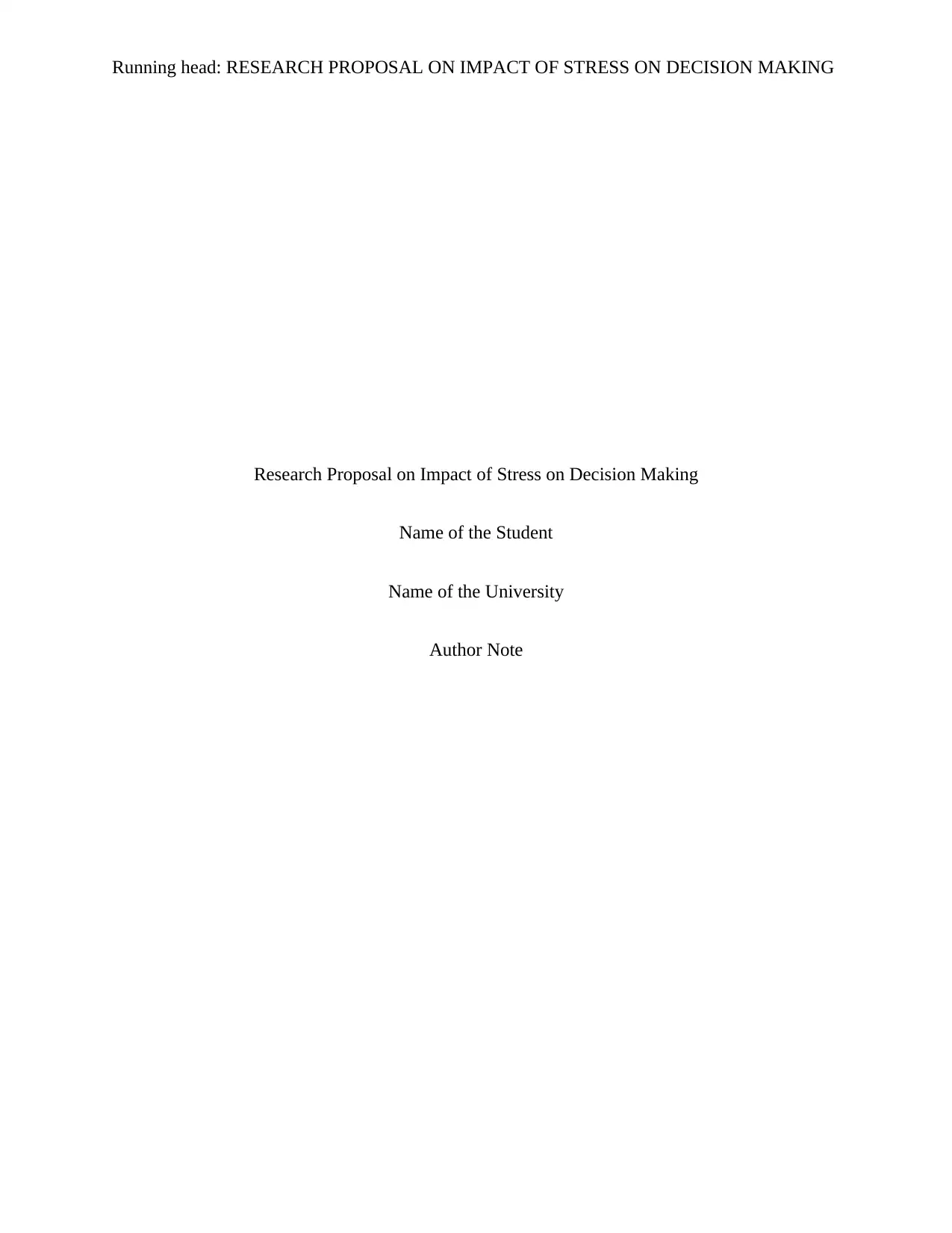
Running head: RESEARCH PROPOSAL ON IMPACT OF STRESS ON DECISION MAKING
Research Proposal on Impact of Stress on Decision Making
Name of the Student
Name of the University
Author Note
Research Proposal on Impact of Stress on Decision Making
Name of the Student
Name of the University
Author Note
Paraphrase This Document
Need a fresh take? Get an instant paraphrase of this document with our AI Paraphraser
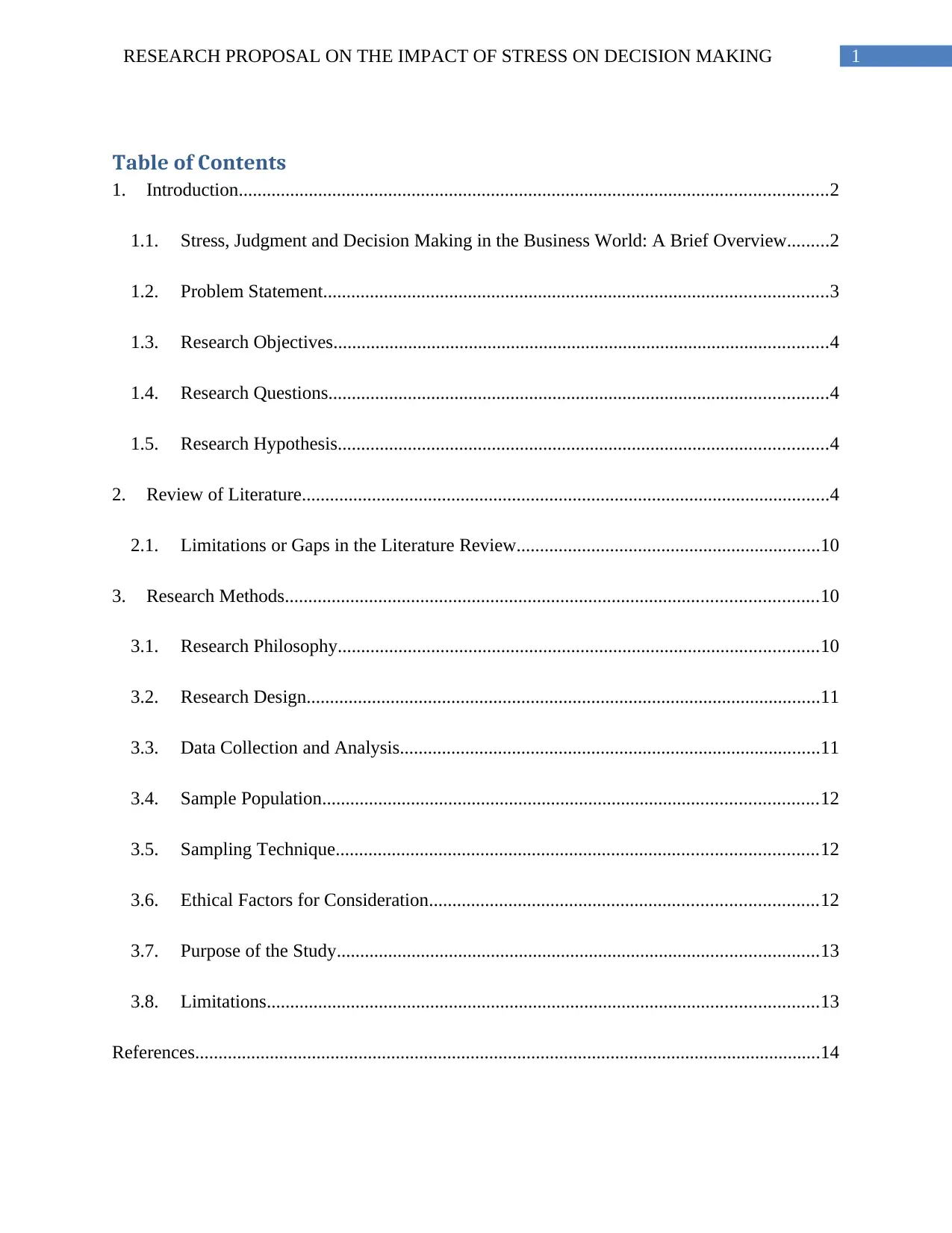
1RESEARCH PROPOSAL ON THE IMPACT OF STRESS ON DECISION MAKING
Table of Contents
1. Introduction..............................................................................................................................2
1.1. Stress, Judgment and Decision Making in the Business World: A Brief Overview.........2
1.2. Problem Statement............................................................................................................3
1.3. Research Objectives..........................................................................................................4
1.4. Research Questions...........................................................................................................4
1.5. Research Hypothesis.........................................................................................................4
2. Review of Literature.................................................................................................................4
2.1. Limitations or Gaps in the Literature Review.................................................................10
3. Research Methods..................................................................................................................10
3.1. Research Philosophy.......................................................................................................10
3.2. Research Design..............................................................................................................11
3.3. Data Collection and Analysis..........................................................................................11
3.4. Sample Population..........................................................................................................12
3.5. Sampling Technique.......................................................................................................12
3.6. Ethical Factors for Consideration...................................................................................12
3.7. Purpose of the Study.......................................................................................................13
3.8. Limitations......................................................................................................................13
References......................................................................................................................................14
Table of Contents
1. Introduction..............................................................................................................................2
1.1. Stress, Judgment and Decision Making in the Business World: A Brief Overview.........2
1.2. Problem Statement............................................................................................................3
1.3. Research Objectives..........................................................................................................4
1.4. Research Questions...........................................................................................................4
1.5. Research Hypothesis.........................................................................................................4
2. Review of Literature.................................................................................................................4
2.1. Limitations or Gaps in the Literature Review.................................................................10
3. Research Methods..................................................................................................................10
3.1. Research Philosophy.......................................................................................................10
3.2. Research Design..............................................................................................................11
3.3. Data Collection and Analysis..........................................................................................11
3.4. Sample Population..........................................................................................................12
3.5. Sampling Technique.......................................................................................................12
3.6. Ethical Factors for Consideration...................................................................................12
3.7. Purpose of the Study.......................................................................................................13
3.8. Limitations......................................................................................................................13
References......................................................................................................................................14
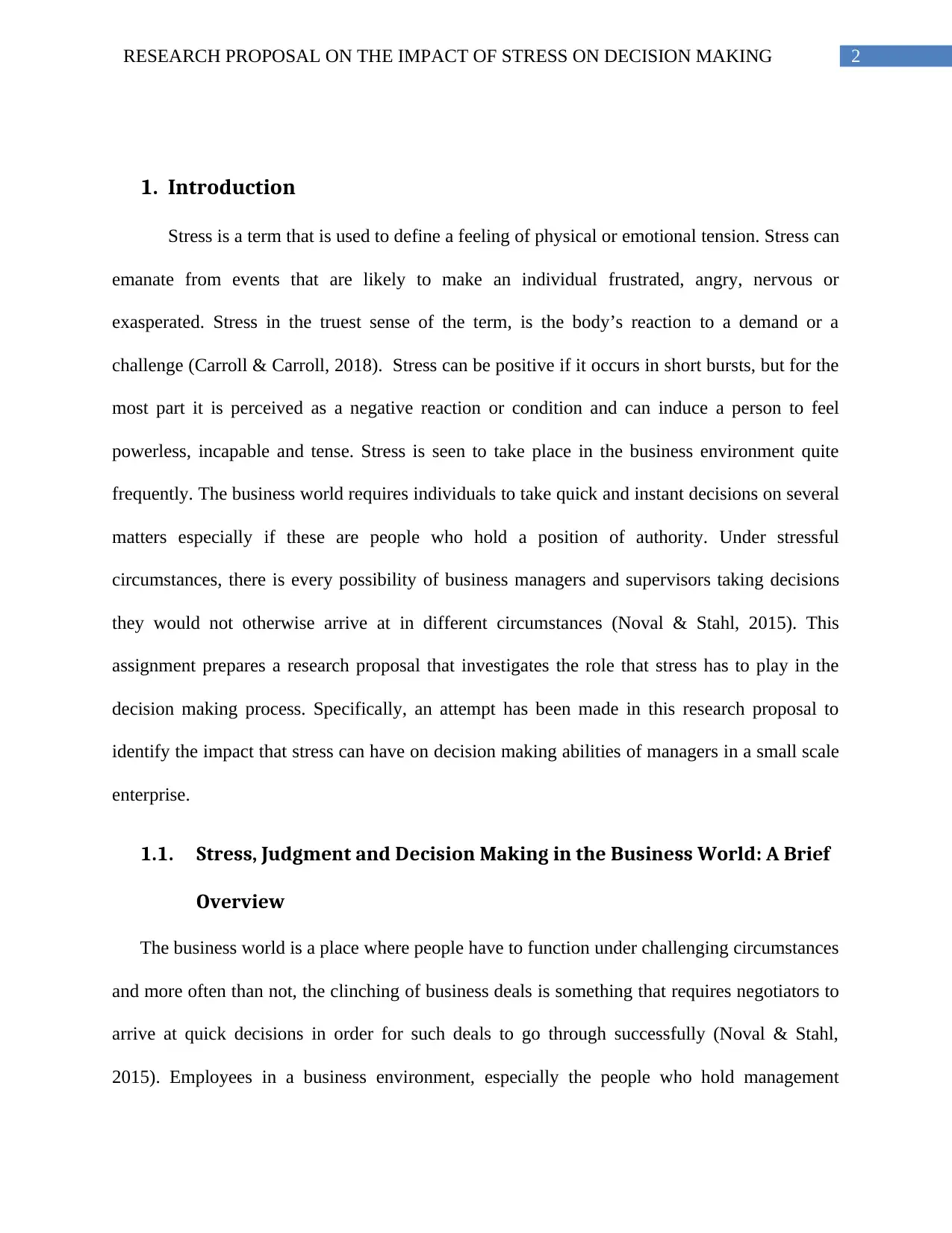
2RESEARCH PROPOSAL ON THE IMPACT OF STRESS ON DECISION MAKING
1. Introduction
Stress is a term that is used to define a feeling of physical or emotional tension. Stress can
emanate from events that are likely to make an individual frustrated, angry, nervous or
exasperated. Stress in the truest sense of the term, is the body’s reaction to a demand or a
challenge (Carroll & Carroll, 2018). Stress can be positive if it occurs in short bursts, but for the
most part it is perceived as a negative reaction or condition and can induce a person to feel
powerless, incapable and tense. Stress is seen to take place in the business environment quite
frequently. The business world requires individuals to take quick and instant decisions on several
matters especially if these are people who hold a position of authority. Under stressful
circumstances, there is every possibility of business managers and supervisors taking decisions
they would not otherwise arrive at in different circumstances (Noval & Stahl, 2015). This
assignment prepares a research proposal that investigates the role that stress has to play in the
decision making process. Specifically, an attempt has been made in this research proposal to
identify the impact that stress can have on decision making abilities of managers in a small scale
enterprise.
1.1. Stress, Judgment and Decision Making in the Business World: A Brief
Overview
The business world is a place where people have to function under challenging circumstances
and more often than not, the clinching of business deals is something that requires negotiators to
arrive at quick decisions in order for such deals to go through successfully (Noval & Stahl,
2015). Employees in a business environment, especially the people who hold management
1. Introduction
Stress is a term that is used to define a feeling of physical or emotional tension. Stress can
emanate from events that are likely to make an individual frustrated, angry, nervous or
exasperated. Stress in the truest sense of the term, is the body’s reaction to a demand or a
challenge (Carroll & Carroll, 2018). Stress can be positive if it occurs in short bursts, but for the
most part it is perceived as a negative reaction or condition and can induce a person to feel
powerless, incapable and tense. Stress is seen to take place in the business environment quite
frequently. The business world requires individuals to take quick and instant decisions on several
matters especially if these are people who hold a position of authority. Under stressful
circumstances, there is every possibility of business managers and supervisors taking decisions
they would not otherwise arrive at in different circumstances (Noval & Stahl, 2015). This
assignment prepares a research proposal that investigates the role that stress has to play in the
decision making process. Specifically, an attempt has been made in this research proposal to
identify the impact that stress can have on decision making abilities of managers in a small scale
enterprise.
1.1. Stress, Judgment and Decision Making in the Business World: A Brief
Overview
The business world is a place where people have to function under challenging circumstances
and more often than not, the clinching of business deals is something that requires negotiators to
arrive at quick decisions in order for such deals to go through successfully (Noval & Stahl,
2015). Employees in a business environment, especially the people who hold management
⊘ This is a preview!⊘
Do you want full access?
Subscribe today to unlock all pages.

Trusted by 1+ million students worldwide
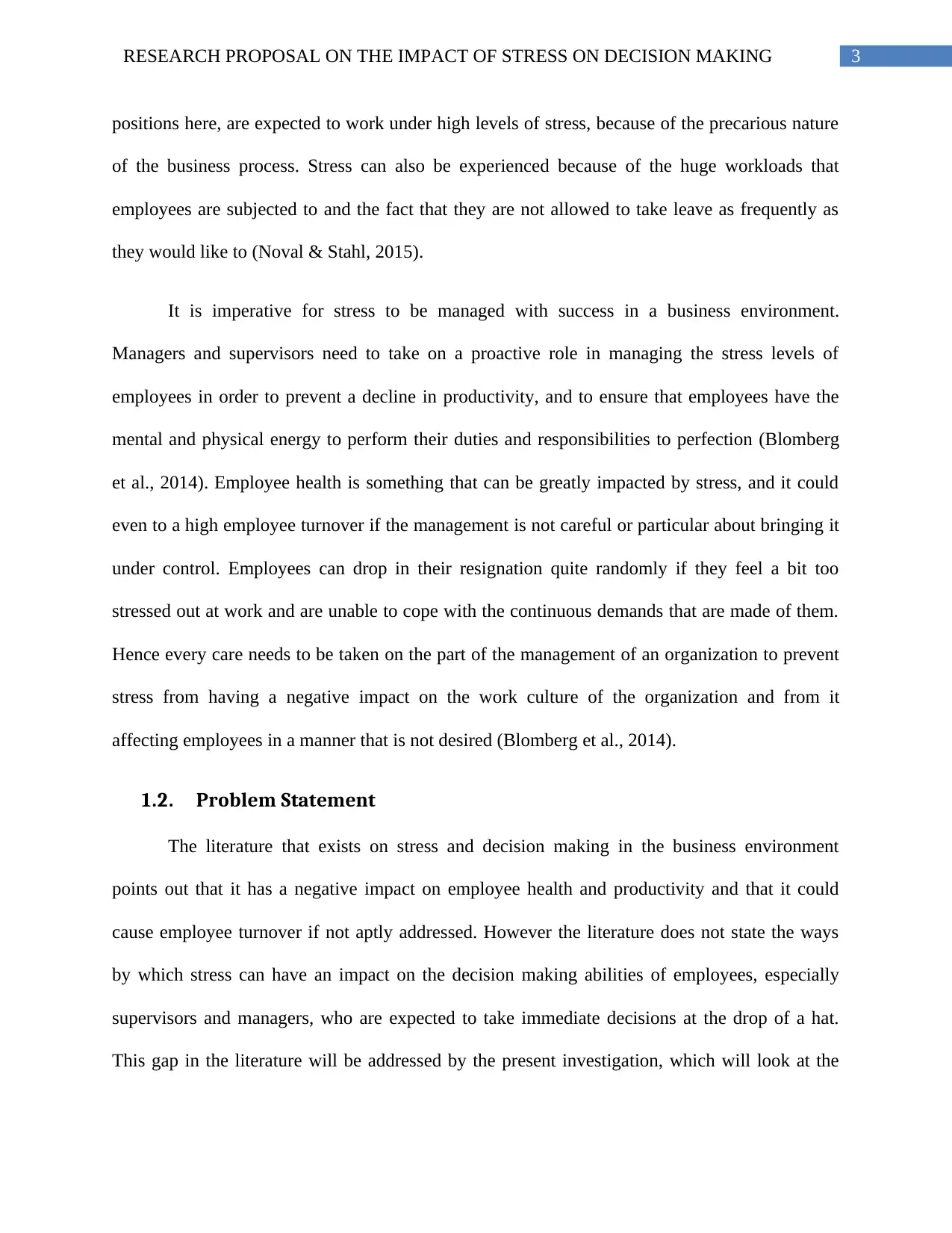
3RESEARCH PROPOSAL ON THE IMPACT OF STRESS ON DECISION MAKING
positions here, are expected to work under high levels of stress, because of the precarious nature
of the business process. Stress can also be experienced because of the huge workloads that
employees are subjected to and the fact that they are not allowed to take leave as frequently as
they would like to (Noval & Stahl, 2015).
It is imperative for stress to be managed with success in a business environment.
Managers and supervisors need to take on a proactive role in managing the stress levels of
employees in order to prevent a decline in productivity, and to ensure that employees have the
mental and physical energy to perform their duties and responsibilities to perfection (Blomberg
et al., 2014). Employee health is something that can be greatly impacted by stress, and it could
even to a high employee turnover if the management is not careful or particular about bringing it
under control. Employees can drop in their resignation quite randomly if they feel a bit too
stressed out at work and are unable to cope with the continuous demands that are made of them.
Hence every care needs to be taken on the part of the management of an organization to prevent
stress from having a negative impact on the work culture of the organization and from it
affecting employees in a manner that is not desired (Blomberg et al., 2014).
1.2. Problem Statement
The literature that exists on stress and decision making in the business environment
points out that it has a negative impact on employee health and productivity and that it could
cause employee turnover if not aptly addressed. However the literature does not state the ways
by which stress can have an impact on the decision making abilities of employees, especially
supervisors and managers, who are expected to take immediate decisions at the drop of a hat.
This gap in the literature will be addressed by the present investigation, which will look at the
positions here, are expected to work under high levels of stress, because of the precarious nature
of the business process. Stress can also be experienced because of the huge workloads that
employees are subjected to and the fact that they are not allowed to take leave as frequently as
they would like to (Noval & Stahl, 2015).
It is imperative for stress to be managed with success in a business environment.
Managers and supervisors need to take on a proactive role in managing the stress levels of
employees in order to prevent a decline in productivity, and to ensure that employees have the
mental and physical energy to perform their duties and responsibilities to perfection (Blomberg
et al., 2014). Employee health is something that can be greatly impacted by stress, and it could
even to a high employee turnover if the management is not careful or particular about bringing it
under control. Employees can drop in their resignation quite randomly if they feel a bit too
stressed out at work and are unable to cope with the continuous demands that are made of them.
Hence every care needs to be taken on the part of the management of an organization to prevent
stress from having a negative impact on the work culture of the organization and from it
affecting employees in a manner that is not desired (Blomberg et al., 2014).
1.2. Problem Statement
The literature that exists on stress and decision making in the business environment
points out that it has a negative impact on employee health and productivity and that it could
cause employee turnover if not aptly addressed. However the literature does not state the ways
by which stress can have an impact on the decision making abilities of employees, especially
supervisors and managers, who are expected to take immediate decisions at the drop of a hat.
This gap in the literature will be addressed by the present investigation, which will look at the
Paraphrase This Document
Need a fresh take? Get an instant paraphrase of this document with our AI Paraphraser
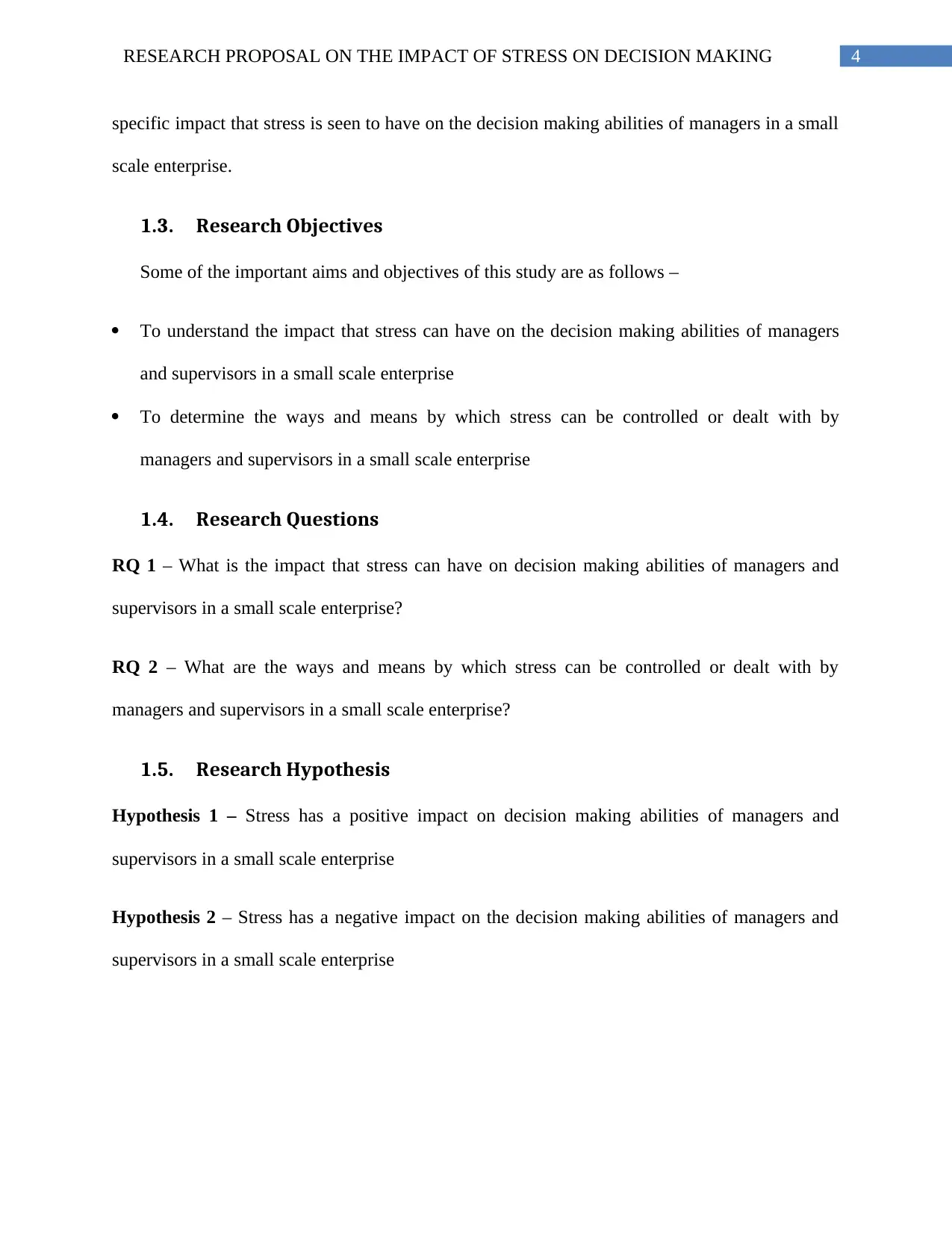
4RESEARCH PROPOSAL ON THE IMPACT OF STRESS ON DECISION MAKING
specific impact that stress is seen to have on the decision making abilities of managers in a small
scale enterprise.
1.3. Research Objectives
Some of the important aims and objectives of this study are as follows –
To understand the impact that stress can have on the decision making abilities of managers
and supervisors in a small scale enterprise
To determine the ways and means by which stress can be controlled or dealt with by
managers and supervisors in a small scale enterprise
1.4. Research Questions
RQ 1 – What is the impact that stress can have on decision making abilities of managers and
supervisors in a small scale enterprise?
RQ 2 – What are the ways and means by which stress can be controlled or dealt with by
managers and supervisors in a small scale enterprise?
1.5. Research Hypothesis
Hypothesis 1 – Stress has a positive impact on decision making abilities of managers and
supervisors in a small scale enterprise
Hypothesis 2 – Stress has a negative impact on the decision making abilities of managers and
supervisors in a small scale enterprise
specific impact that stress is seen to have on the decision making abilities of managers in a small
scale enterprise.
1.3. Research Objectives
Some of the important aims and objectives of this study are as follows –
To understand the impact that stress can have on the decision making abilities of managers
and supervisors in a small scale enterprise
To determine the ways and means by which stress can be controlled or dealt with by
managers and supervisors in a small scale enterprise
1.4. Research Questions
RQ 1 – What is the impact that stress can have on decision making abilities of managers and
supervisors in a small scale enterprise?
RQ 2 – What are the ways and means by which stress can be controlled or dealt with by
managers and supervisors in a small scale enterprise?
1.5. Research Hypothesis
Hypothesis 1 – Stress has a positive impact on decision making abilities of managers and
supervisors in a small scale enterprise
Hypothesis 2 – Stress has a negative impact on the decision making abilities of managers and
supervisors in a small scale enterprise
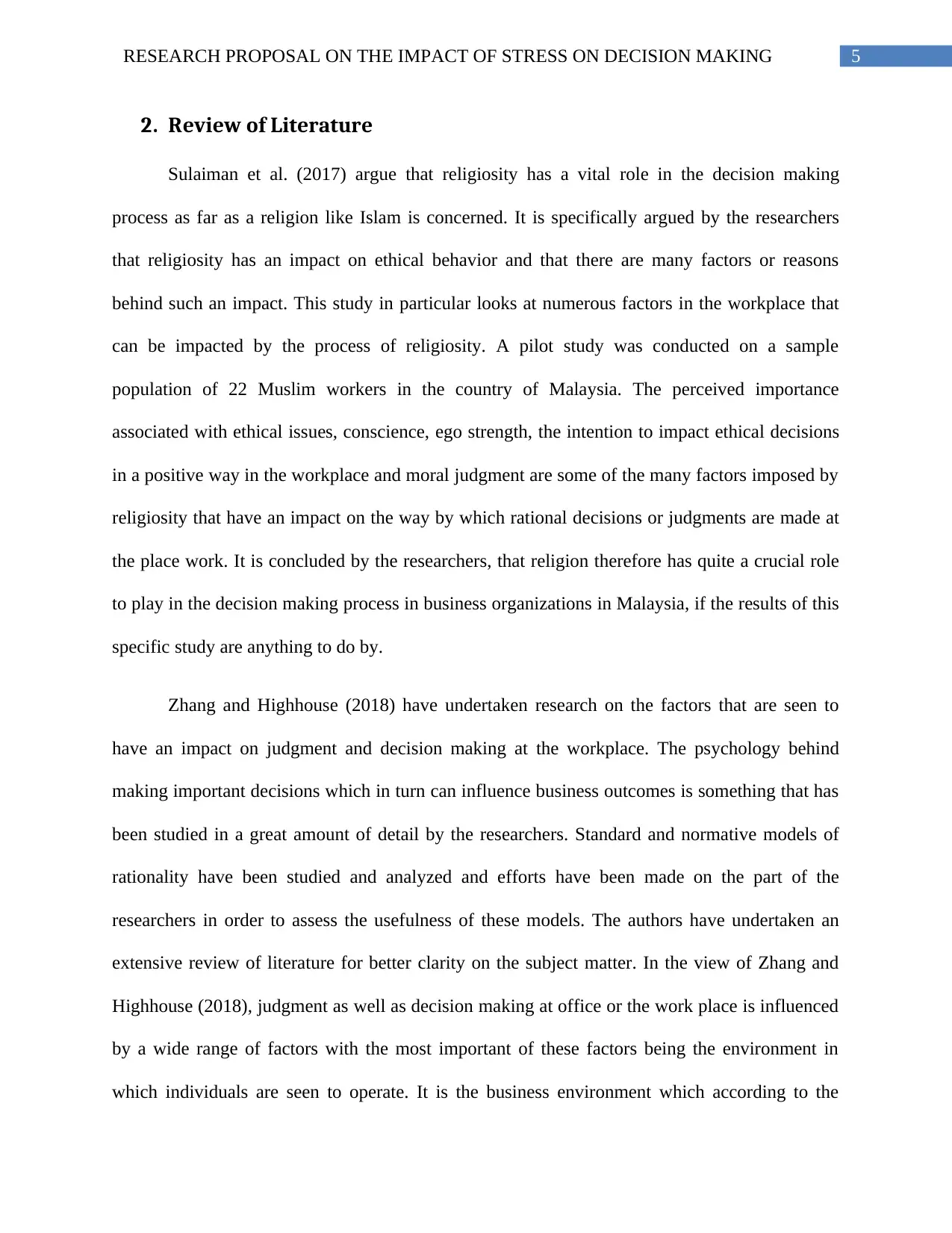
5RESEARCH PROPOSAL ON THE IMPACT OF STRESS ON DECISION MAKING
2. Review of Literature
Sulaiman et al. (2017) argue that religiosity has a vital role in the decision making
process as far as a religion like Islam is concerned. It is specifically argued by the researchers
that religiosity has an impact on ethical behavior and that there are many factors or reasons
behind such an impact. This study in particular looks at numerous factors in the workplace that
can be impacted by the process of religiosity. A pilot study was conducted on a sample
population of 22 Muslim workers in the country of Malaysia. The perceived importance
associated with ethical issues, conscience, ego strength, the intention to impact ethical decisions
in a positive way in the workplace and moral judgment are some of the many factors imposed by
religiosity that have an impact on the way by which rational decisions or judgments are made at
the place work. It is concluded by the researchers, that religion therefore has quite a crucial role
to play in the decision making process in business organizations in Malaysia, if the results of this
specific study are anything to do by.
Zhang and Highhouse (2018) have undertaken research on the factors that are seen to
have an impact on judgment and decision making at the workplace. The psychology behind
making important decisions which in turn can influence business outcomes is something that has
been studied in a great amount of detail by the researchers. Standard and normative models of
rationality have been studied and analyzed and efforts have been made on the part of the
researchers in order to assess the usefulness of these models. The authors have undertaken an
extensive review of literature for better clarity on the subject matter. In the view of Zhang and
Highhouse (2018), judgment as well as decision making at office or the work place is influenced
by a wide range of factors with the most important of these factors being the environment in
which individuals are seen to operate. It is the business environment which according to the
2. Review of Literature
Sulaiman et al. (2017) argue that religiosity has a vital role in the decision making
process as far as a religion like Islam is concerned. It is specifically argued by the researchers
that religiosity has an impact on ethical behavior and that there are many factors or reasons
behind such an impact. This study in particular looks at numerous factors in the workplace that
can be impacted by the process of religiosity. A pilot study was conducted on a sample
population of 22 Muslim workers in the country of Malaysia. The perceived importance
associated with ethical issues, conscience, ego strength, the intention to impact ethical decisions
in a positive way in the workplace and moral judgment are some of the many factors imposed by
religiosity that have an impact on the way by which rational decisions or judgments are made at
the place work. It is concluded by the researchers, that religion therefore has quite a crucial role
to play in the decision making process in business organizations in Malaysia, if the results of this
specific study are anything to do by.
Zhang and Highhouse (2018) have undertaken research on the factors that are seen to
have an impact on judgment and decision making at the workplace. The psychology behind
making important decisions which in turn can influence business outcomes is something that has
been studied in a great amount of detail by the researchers. Standard and normative models of
rationality have been studied and analyzed and efforts have been made on the part of the
researchers in order to assess the usefulness of these models. The authors have undertaken an
extensive review of literature for better clarity on the subject matter. In the view of Zhang and
Highhouse (2018), judgment as well as decision making at office or the work place is influenced
by a wide range of factors with the most important of these factors being the environment in
which individuals are seen to operate. It is the business environment which according to the
⊘ This is a preview!⊘
Do you want full access?
Subscribe today to unlock all pages.

Trusted by 1+ million students worldwide
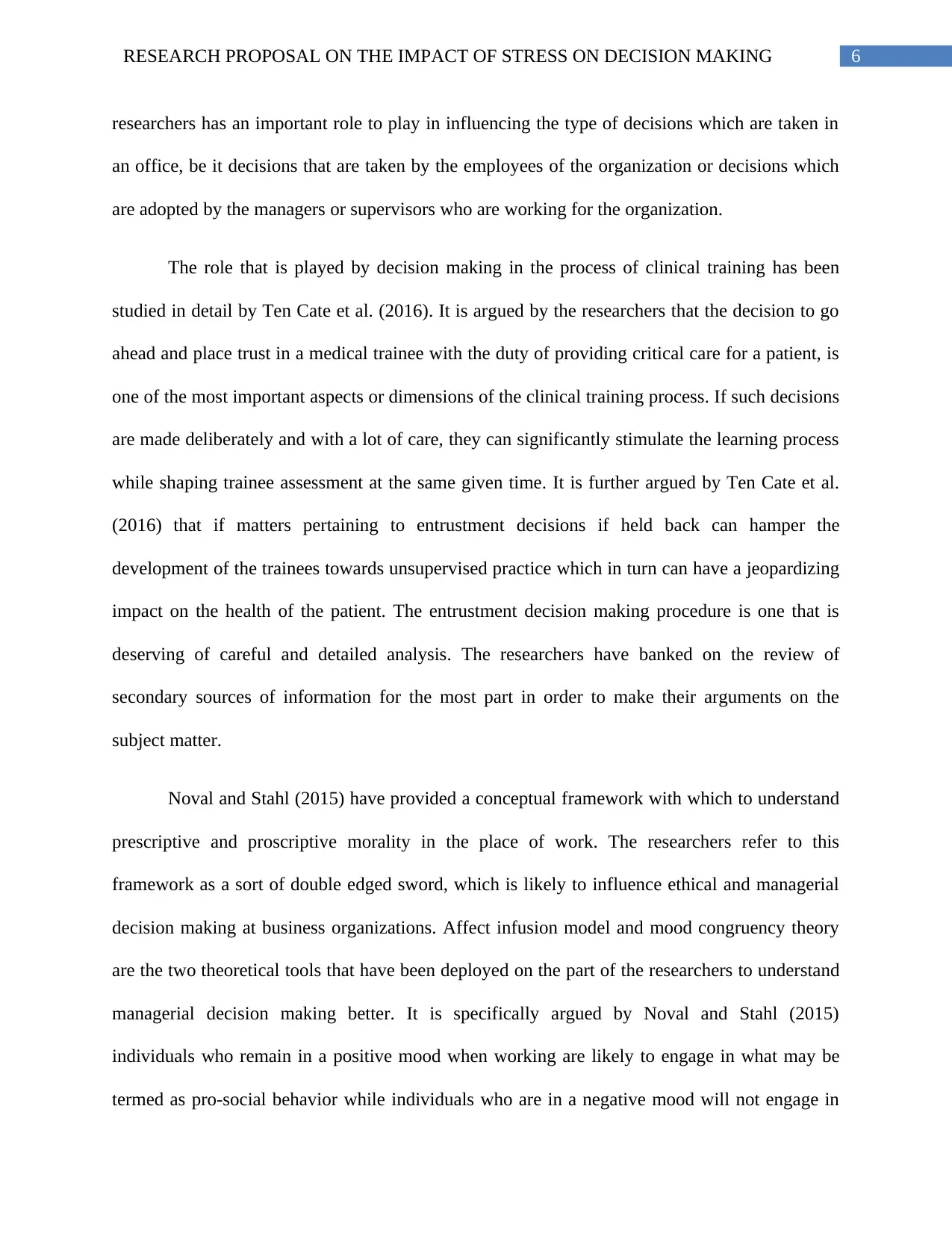
6RESEARCH PROPOSAL ON THE IMPACT OF STRESS ON DECISION MAKING
researchers has an important role to play in influencing the type of decisions which are taken in
an office, be it decisions that are taken by the employees of the organization or decisions which
are adopted by the managers or supervisors who are working for the organization.
The role that is played by decision making in the process of clinical training has been
studied in detail by Ten Cate et al. (2016). It is argued by the researchers that the decision to go
ahead and place trust in a medical trainee with the duty of providing critical care for a patient, is
one of the most important aspects or dimensions of the clinical training process. If such decisions
are made deliberately and with a lot of care, they can significantly stimulate the learning process
while shaping trainee assessment at the same given time. It is further argued by Ten Cate et al.
(2016) that if matters pertaining to entrustment decisions if held back can hamper the
development of the trainees towards unsupervised practice which in turn can have a jeopardizing
impact on the health of the patient. The entrustment decision making procedure is one that is
deserving of careful and detailed analysis. The researchers have banked on the review of
secondary sources of information for the most part in order to make their arguments on the
subject matter.
Noval and Stahl (2015) have provided a conceptual framework with which to understand
prescriptive and proscriptive morality in the place of work. The researchers refer to this
framework as a sort of double edged sword, which is likely to influence ethical and managerial
decision making at business organizations. Affect infusion model and mood congruency theory
are the two theoretical tools that have been deployed on the part of the researchers to understand
managerial decision making better. It is specifically argued by Noval and Stahl (2015)
individuals who remain in a positive mood when working are likely to engage in what may be
termed as pro-social behavior while individuals who are in a negative mood will not engage in
researchers has an important role to play in influencing the type of decisions which are taken in
an office, be it decisions that are taken by the employees of the organization or decisions which
are adopted by the managers or supervisors who are working for the organization.
The role that is played by decision making in the process of clinical training has been
studied in detail by Ten Cate et al. (2016). It is argued by the researchers that the decision to go
ahead and place trust in a medical trainee with the duty of providing critical care for a patient, is
one of the most important aspects or dimensions of the clinical training process. If such decisions
are made deliberately and with a lot of care, they can significantly stimulate the learning process
while shaping trainee assessment at the same given time. It is further argued by Ten Cate et al.
(2016) that if matters pertaining to entrustment decisions if held back can hamper the
development of the trainees towards unsupervised practice which in turn can have a jeopardizing
impact on the health of the patient. The entrustment decision making procedure is one that is
deserving of careful and detailed analysis. The researchers have banked on the review of
secondary sources of information for the most part in order to make their arguments on the
subject matter.
Noval and Stahl (2015) have provided a conceptual framework with which to understand
prescriptive and proscriptive morality in the place of work. The researchers refer to this
framework as a sort of double edged sword, which is likely to influence ethical and managerial
decision making at business organizations. Affect infusion model and mood congruency theory
are the two theoretical tools that have been deployed on the part of the researchers to understand
managerial decision making better. It is specifically argued by Noval and Stahl (2015)
individuals who remain in a positive mood when working are likely to engage in what may be
termed as pro-social behavior while individuals who are in a negative mood will not engage in
Paraphrase This Document
Need a fresh take? Get an instant paraphrase of this document with our AI Paraphraser
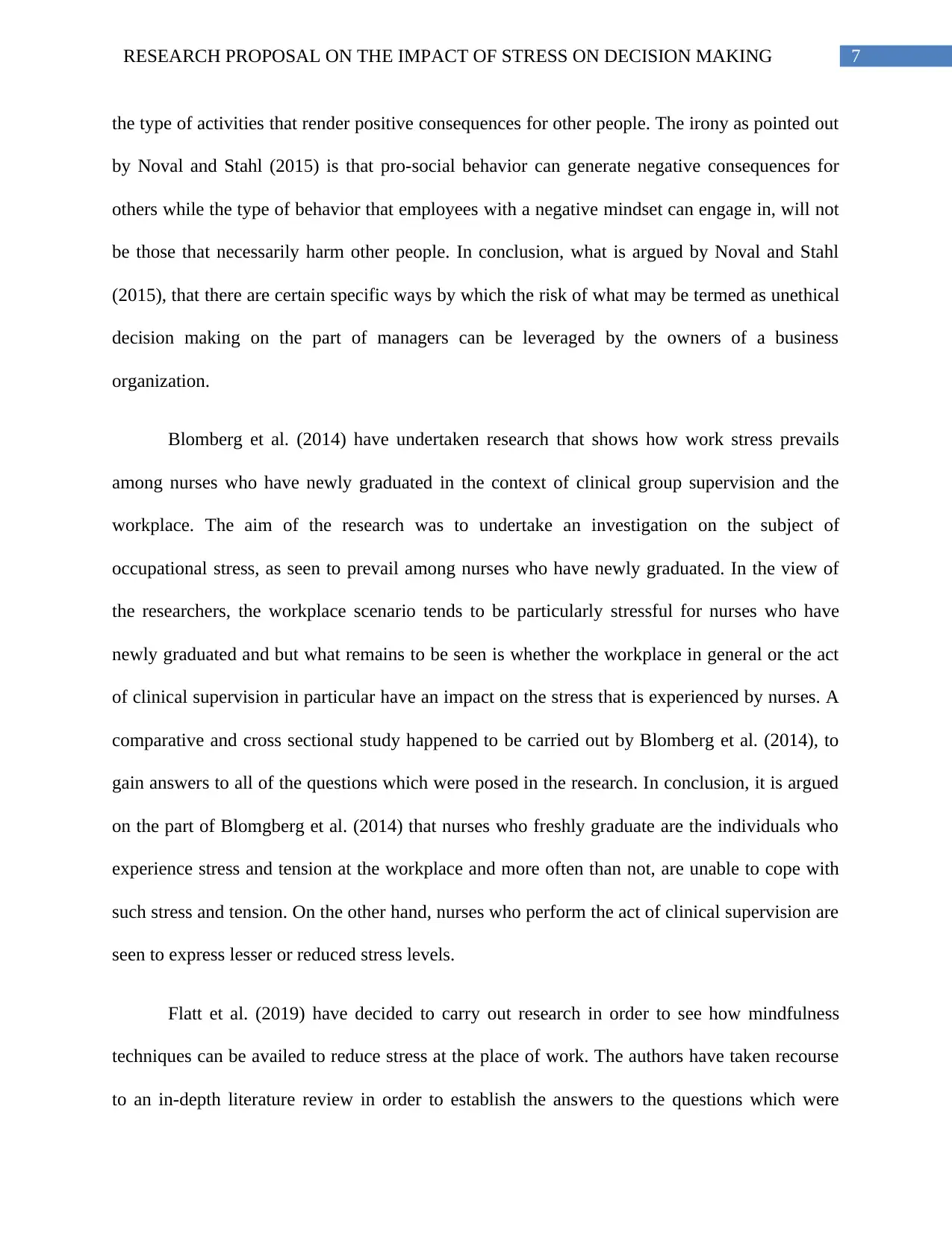
7RESEARCH PROPOSAL ON THE IMPACT OF STRESS ON DECISION MAKING
the type of activities that render positive consequences for other people. The irony as pointed out
by Noval and Stahl (2015) is that pro-social behavior can generate negative consequences for
others while the type of behavior that employees with a negative mindset can engage in, will not
be those that necessarily harm other people. In conclusion, what is argued by Noval and Stahl
(2015), that there are certain specific ways by which the risk of what may be termed as unethical
decision making on the part of managers can be leveraged by the owners of a business
organization.
Blomberg et al. (2014) have undertaken research that shows how work stress prevails
among nurses who have newly graduated in the context of clinical group supervision and the
workplace. The aim of the research was to undertake an investigation on the subject of
occupational stress, as seen to prevail among nurses who have newly graduated. In the view of
the researchers, the workplace scenario tends to be particularly stressful for nurses who have
newly graduated and but what remains to be seen is whether the workplace in general or the act
of clinical supervision in particular have an impact on the stress that is experienced by nurses. A
comparative and cross sectional study happened to be carried out by Blomberg et al. (2014), to
gain answers to all of the questions which were posed in the research. In conclusion, it is argued
on the part of Blomgberg et al. (2014) that nurses who freshly graduate are the individuals who
experience stress and tension at the workplace and more often than not, are unable to cope with
such stress and tension. On the other hand, nurses who perform the act of clinical supervision are
seen to express lesser or reduced stress levels.
Flatt et al. (2019) have decided to carry out research in order to see how mindfulness
techniques can be availed to reduce stress at the place of work. The authors have taken recourse
to an in-depth literature review in order to establish the answers to the questions which were
the type of activities that render positive consequences for other people. The irony as pointed out
by Noval and Stahl (2015) is that pro-social behavior can generate negative consequences for
others while the type of behavior that employees with a negative mindset can engage in, will not
be those that necessarily harm other people. In conclusion, what is argued by Noval and Stahl
(2015), that there are certain specific ways by which the risk of what may be termed as unethical
decision making on the part of managers can be leveraged by the owners of a business
organization.
Blomberg et al. (2014) have undertaken research that shows how work stress prevails
among nurses who have newly graduated in the context of clinical group supervision and the
workplace. The aim of the research was to undertake an investigation on the subject of
occupational stress, as seen to prevail among nurses who have newly graduated. In the view of
the researchers, the workplace scenario tends to be particularly stressful for nurses who have
newly graduated and but what remains to be seen is whether the workplace in general or the act
of clinical supervision in particular have an impact on the stress that is experienced by nurses. A
comparative and cross sectional study happened to be carried out by Blomberg et al. (2014), to
gain answers to all of the questions which were posed in the research. In conclusion, it is argued
on the part of Blomgberg et al. (2014) that nurses who freshly graduate are the individuals who
experience stress and tension at the workplace and more often than not, are unable to cope with
such stress and tension. On the other hand, nurses who perform the act of clinical supervision are
seen to express lesser or reduced stress levels.
Flatt et al. (2019) have decided to carry out research in order to see how mindfulness
techniques can be availed to reduce stress at the place of work. The authors have taken recourse
to an in-depth literature review in order to establish the answers to the questions which were
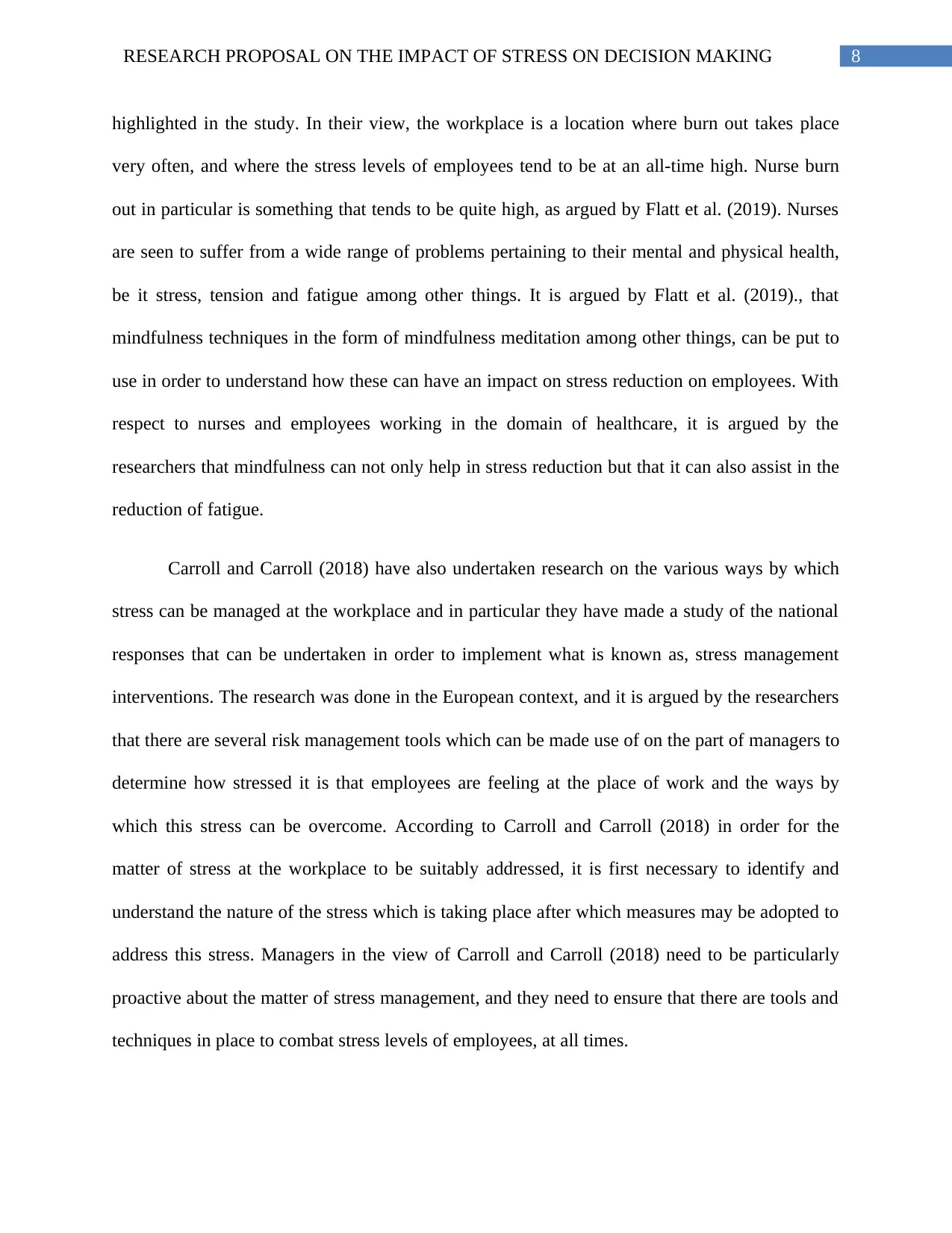
8RESEARCH PROPOSAL ON THE IMPACT OF STRESS ON DECISION MAKING
highlighted in the study. In their view, the workplace is a location where burn out takes place
very often, and where the stress levels of employees tend to be at an all-time high. Nurse burn
out in particular is something that tends to be quite high, as argued by Flatt et al. (2019). Nurses
are seen to suffer from a wide range of problems pertaining to their mental and physical health,
be it stress, tension and fatigue among other things. It is argued by Flatt et al. (2019)., that
mindfulness techniques in the form of mindfulness meditation among other things, can be put to
use in order to understand how these can have an impact on stress reduction on employees. With
respect to nurses and employees working in the domain of healthcare, it is argued by the
researchers that mindfulness can not only help in stress reduction but that it can also assist in the
reduction of fatigue.
Carroll and Carroll (2018) have also undertaken research on the various ways by which
stress can be managed at the workplace and in particular they have made a study of the national
responses that can be undertaken in order to implement what is known as, stress management
interventions. The research was done in the European context, and it is argued by the researchers
that there are several risk management tools which can be made use of on the part of managers to
determine how stressed it is that employees are feeling at the place of work and the ways by
which this stress can be overcome. According to Carroll and Carroll (2018) in order for the
matter of stress at the workplace to be suitably addressed, it is first necessary to identify and
understand the nature of the stress which is taking place after which measures may be adopted to
address this stress. Managers in the view of Carroll and Carroll (2018) need to be particularly
proactive about the matter of stress management, and they need to ensure that there are tools and
techniques in place to combat stress levels of employees, at all times.
highlighted in the study. In their view, the workplace is a location where burn out takes place
very often, and where the stress levels of employees tend to be at an all-time high. Nurse burn
out in particular is something that tends to be quite high, as argued by Flatt et al. (2019). Nurses
are seen to suffer from a wide range of problems pertaining to their mental and physical health,
be it stress, tension and fatigue among other things. It is argued by Flatt et al. (2019)., that
mindfulness techniques in the form of mindfulness meditation among other things, can be put to
use in order to understand how these can have an impact on stress reduction on employees. With
respect to nurses and employees working in the domain of healthcare, it is argued by the
researchers that mindfulness can not only help in stress reduction but that it can also assist in the
reduction of fatigue.
Carroll and Carroll (2018) have also undertaken research on the various ways by which
stress can be managed at the workplace and in particular they have made a study of the national
responses that can be undertaken in order to implement what is known as, stress management
interventions. The research was done in the European context, and it is argued by the researchers
that there are several risk management tools which can be made use of on the part of managers to
determine how stressed it is that employees are feeling at the place of work and the ways by
which this stress can be overcome. According to Carroll and Carroll (2018) in order for the
matter of stress at the workplace to be suitably addressed, it is first necessary to identify and
understand the nature of the stress which is taking place after which measures may be adopted to
address this stress. Managers in the view of Carroll and Carroll (2018) need to be particularly
proactive about the matter of stress management, and they need to ensure that there are tools and
techniques in place to combat stress levels of employees, at all times.
⊘ This is a preview!⊘
Do you want full access?
Subscribe today to unlock all pages.

Trusted by 1+ million students worldwide
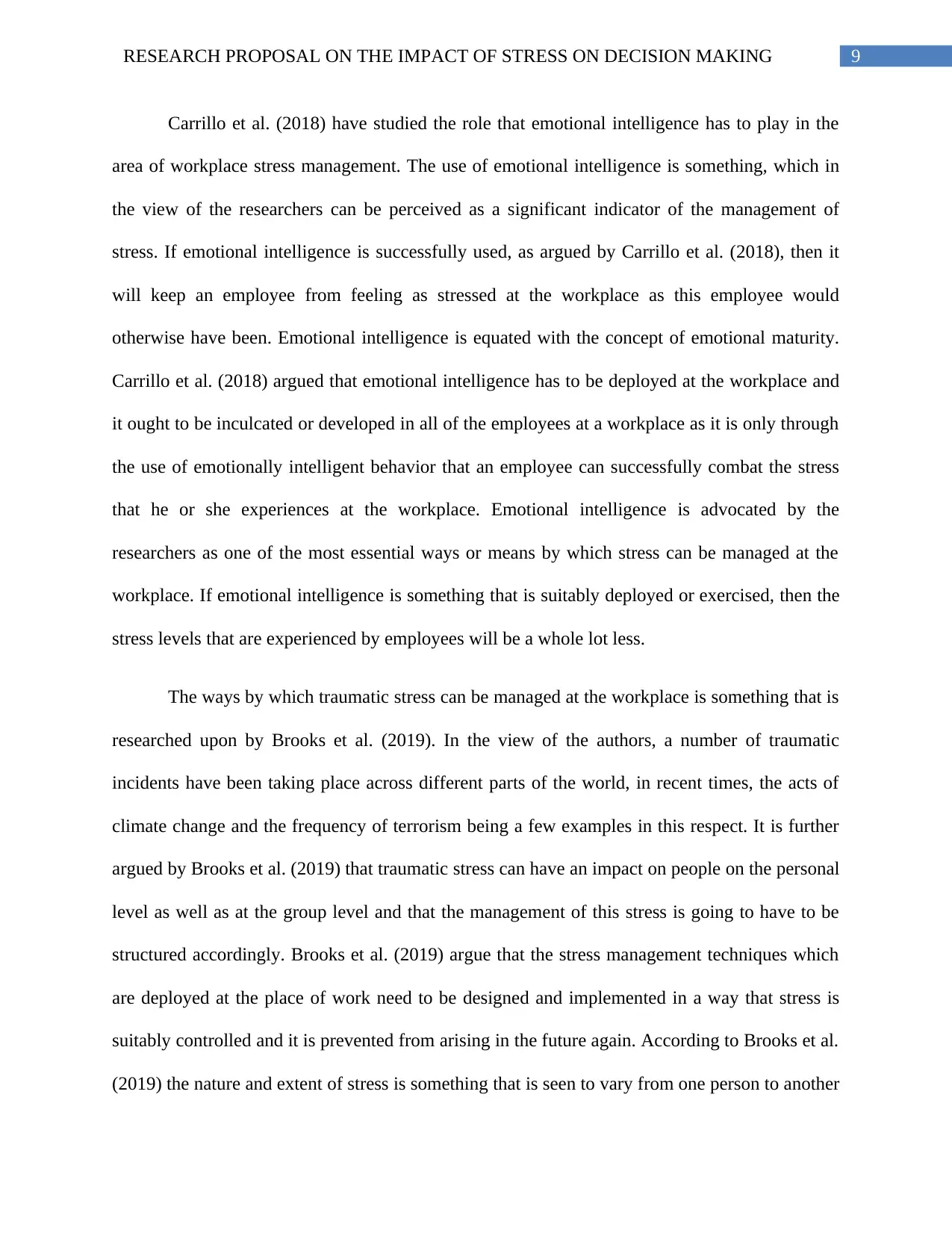
9RESEARCH PROPOSAL ON THE IMPACT OF STRESS ON DECISION MAKING
Carrillo et al. (2018) have studied the role that emotional intelligence has to play in the
area of workplace stress management. The use of emotional intelligence is something, which in
the view of the researchers can be perceived as a significant indicator of the management of
stress. If emotional intelligence is successfully used, as argued by Carrillo et al. (2018), then it
will keep an employee from feeling as stressed at the workplace as this employee would
otherwise have been. Emotional intelligence is equated with the concept of emotional maturity.
Carrillo et al. (2018) argued that emotional intelligence has to be deployed at the workplace and
it ought to be inculcated or developed in all of the employees at a workplace as it is only through
the use of emotionally intelligent behavior that an employee can successfully combat the stress
that he or she experiences at the workplace. Emotional intelligence is advocated by the
researchers as one of the most essential ways or means by which stress can be managed at the
workplace. If emotional intelligence is something that is suitably deployed or exercised, then the
stress levels that are experienced by employees will be a whole lot less.
The ways by which traumatic stress can be managed at the workplace is something that is
researched upon by Brooks et al. (2019). In the view of the authors, a number of traumatic
incidents have been taking place across different parts of the world, in recent times, the acts of
climate change and the frequency of terrorism being a few examples in this respect. It is further
argued by Brooks et al. (2019) that traumatic stress can have an impact on people on the personal
level as well as at the group level and that the management of this stress is going to have to be
structured accordingly. Brooks et al. (2019) argue that the stress management techniques which
are deployed at the place of work need to be designed and implemented in a way that stress is
suitably controlled and it is prevented from arising in the future again. According to Brooks et al.
(2019) the nature and extent of stress is something that is seen to vary from one person to another
Carrillo et al. (2018) have studied the role that emotional intelligence has to play in the
area of workplace stress management. The use of emotional intelligence is something, which in
the view of the researchers can be perceived as a significant indicator of the management of
stress. If emotional intelligence is successfully used, as argued by Carrillo et al. (2018), then it
will keep an employee from feeling as stressed at the workplace as this employee would
otherwise have been. Emotional intelligence is equated with the concept of emotional maturity.
Carrillo et al. (2018) argued that emotional intelligence has to be deployed at the workplace and
it ought to be inculcated or developed in all of the employees at a workplace as it is only through
the use of emotionally intelligent behavior that an employee can successfully combat the stress
that he or she experiences at the workplace. Emotional intelligence is advocated by the
researchers as one of the most essential ways or means by which stress can be managed at the
workplace. If emotional intelligence is something that is suitably deployed or exercised, then the
stress levels that are experienced by employees will be a whole lot less.
The ways by which traumatic stress can be managed at the workplace is something that is
researched upon by Brooks et al. (2019). In the view of the authors, a number of traumatic
incidents have been taking place across different parts of the world, in recent times, the acts of
climate change and the frequency of terrorism being a few examples in this respect. It is further
argued by Brooks et al. (2019) that traumatic stress can have an impact on people on the personal
level as well as at the group level and that the management of this stress is going to have to be
structured accordingly. Brooks et al. (2019) argue that the stress management techniques which
are deployed at the place of work need to be designed and implemented in a way that stress is
suitably controlled and it is prevented from arising in the future again. According to Brooks et al.
(2019) the nature and extent of stress is something that is seen to vary from one person to another
Paraphrase This Document
Need a fresh take? Get an instant paraphrase of this document with our AI Paraphraser
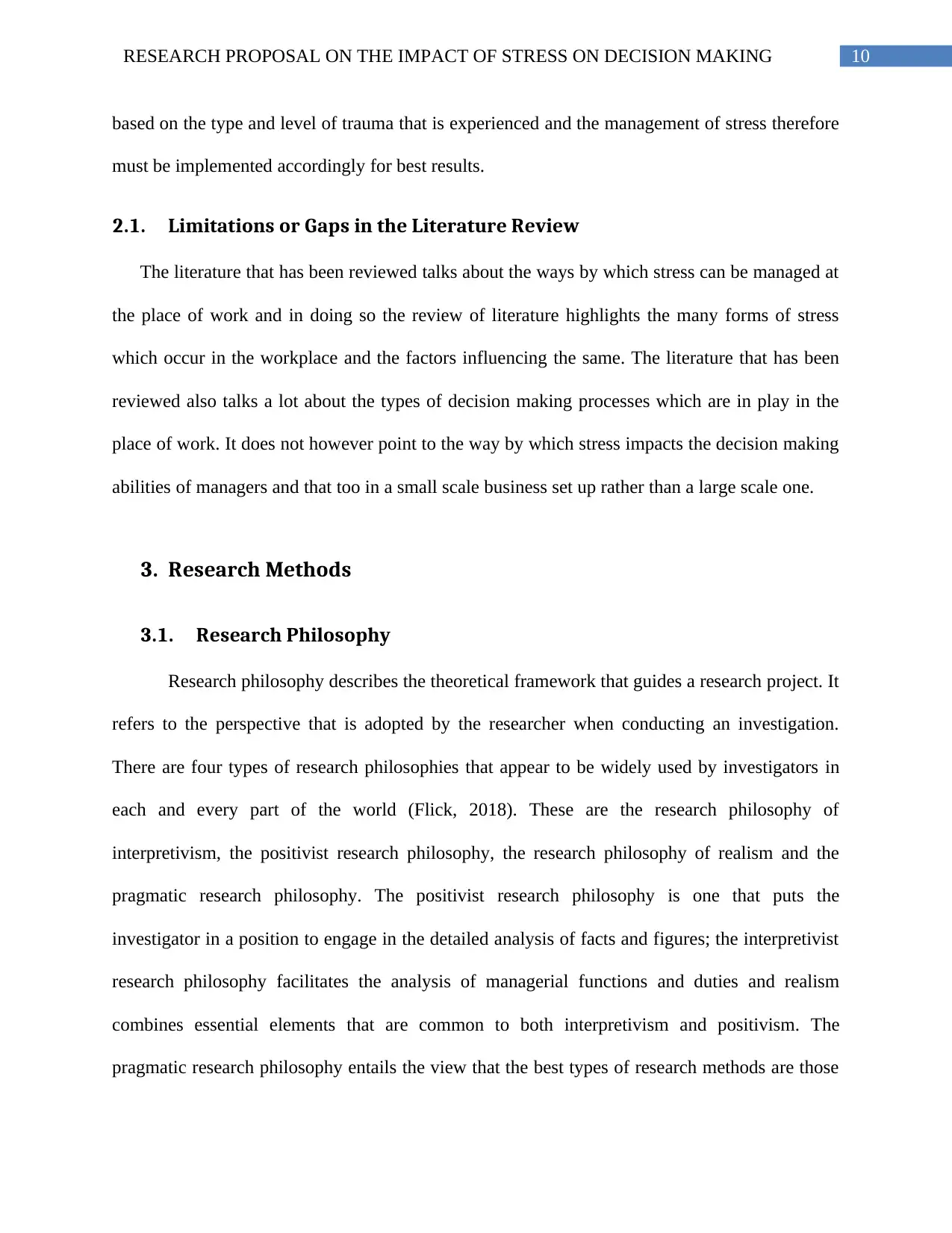
10RESEARCH PROPOSAL ON THE IMPACT OF STRESS ON DECISION MAKING
based on the type and level of trauma that is experienced and the management of stress therefore
must be implemented accordingly for best results.
2.1. Limitations or Gaps in the Literature Review
The literature that has been reviewed talks about the ways by which stress can be managed at
the place of work and in doing so the review of literature highlights the many forms of stress
which occur in the workplace and the factors influencing the same. The literature that has been
reviewed also talks a lot about the types of decision making processes which are in play in the
place of work. It does not however point to the way by which stress impacts the decision making
abilities of managers and that too in a small scale business set up rather than a large scale one.
3. Research Methods
3.1. Research Philosophy
Research philosophy describes the theoretical framework that guides a research project. It
refers to the perspective that is adopted by the researcher when conducting an investigation.
There are four types of research philosophies that appear to be widely used by investigators in
each and every part of the world (Flick, 2018). These are the research philosophy of
interpretivism, the positivist research philosophy, the research philosophy of realism and the
pragmatic research philosophy. The positivist research philosophy is one that puts the
investigator in a position to engage in the detailed analysis of facts and figures; the interpretivist
research philosophy facilitates the analysis of managerial functions and duties and realism
combines essential elements that are common to both interpretivism and positivism. The
pragmatic research philosophy entails the view that the best types of research methods are those
based on the type and level of trauma that is experienced and the management of stress therefore
must be implemented accordingly for best results.
2.1. Limitations or Gaps in the Literature Review
The literature that has been reviewed talks about the ways by which stress can be managed at
the place of work and in doing so the review of literature highlights the many forms of stress
which occur in the workplace and the factors influencing the same. The literature that has been
reviewed also talks a lot about the types of decision making processes which are in play in the
place of work. It does not however point to the way by which stress impacts the decision making
abilities of managers and that too in a small scale business set up rather than a large scale one.
3. Research Methods
3.1. Research Philosophy
Research philosophy describes the theoretical framework that guides a research project. It
refers to the perspective that is adopted by the researcher when conducting an investigation.
There are four types of research philosophies that appear to be widely used by investigators in
each and every part of the world (Flick, 2018). These are the research philosophy of
interpretivism, the positivist research philosophy, the research philosophy of realism and the
pragmatic research philosophy. The positivist research philosophy is one that puts the
investigator in a position to engage in the detailed analysis of facts and figures; the interpretivist
research philosophy facilitates the analysis of managerial functions and duties and realism
combines essential elements that are common to both interpretivism and positivism. The
pragmatic research philosophy entails the view that the best types of research methods are those
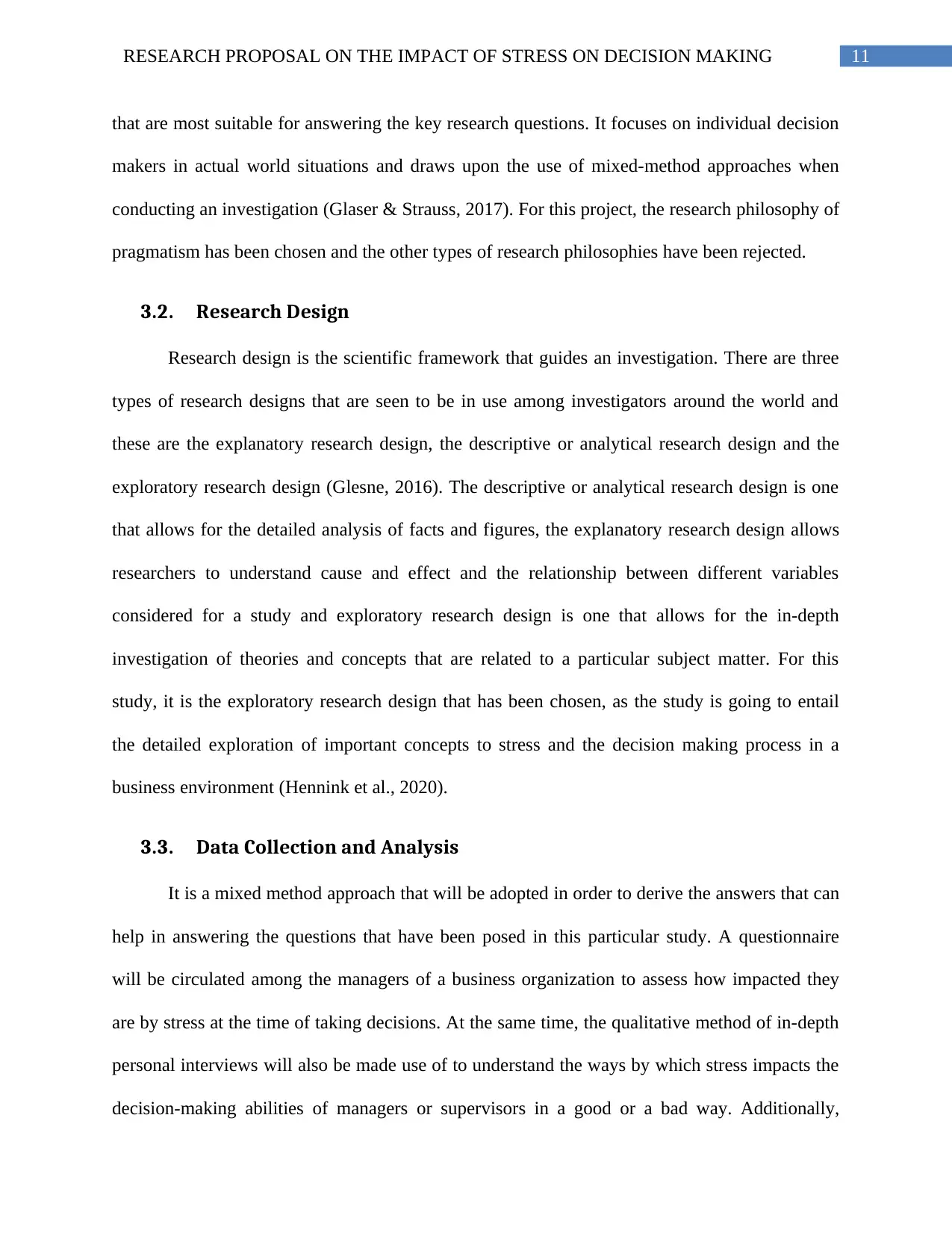
11RESEARCH PROPOSAL ON THE IMPACT OF STRESS ON DECISION MAKING
that are most suitable for answering the key research questions. It focuses on individual decision
makers in actual world situations and draws upon the use of mixed-method approaches when
conducting an investigation (Glaser & Strauss, 2017). For this project, the research philosophy of
pragmatism has been chosen and the other types of research philosophies have been rejected.
3.2. Research Design
Research design is the scientific framework that guides an investigation. There are three
types of research designs that are seen to be in use among investigators around the world and
these are the explanatory research design, the descriptive or analytical research design and the
exploratory research design (Glesne, 2016). The descriptive or analytical research design is one
that allows for the detailed analysis of facts and figures, the explanatory research design allows
researchers to understand cause and effect and the relationship between different variables
considered for a study and exploratory research design is one that allows for the in-depth
investigation of theories and concepts that are related to a particular subject matter. For this
study, it is the exploratory research design that has been chosen, as the study is going to entail
the detailed exploration of important concepts to stress and the decision making process in a
business environment (Hennink et al., 2020).
3.3. Data Collection and Analysis
It is a mixed method approach that will be adopted in order to derive the answers that can
help in answering the questions that have been posed in this particular study. A questionnaire
will be circulated among the managers of a business organization to assess how impacted they
are by stress at the time of taking decisions. At the same time, the qualitative method of in-depth
personal interviews will also be made use of to understand the ways by which stress impacts the
decision-making abilities of managers or supervisors in a good or a bad way. Additionally,
that are most suitable for answering the key research questions. It focuses on individual decision
makers in actual world situations and draws upon the use of mixed-method approaches when
conducting an investigation (Glaser & Strauss, 2017). For this project, the research philosophy of
pragmatism has been chosen and the other types of research philosophies have been rejected.
3.2. Research Design
Research design is the scientific framework that guides an investigation. There are three
types of research designs that are seen to be in use among investigators around the world and
these are the explanatory research design, the descriptive or analytical research design and the
exploratory research design (Glesne, 2016). The descriptive or analytical research design is one
that allows for the detailed analysis of facts and figures, the explanatory research design allows
researchers to understand cause and effect and the relationship between different variables
considered for a study and exploratory research design is one that allows for the in-depth
investigation of theories and concepts that are related to a particular subject matter. For this
study, it is the exploratory research design that has been chosen, as the study is going to entail
the detailed exploration of important concepts to stress and the decision making process in a
business environment (Hennink et al., 2020).
3.3. Data Collection and Analysis
It is a mixed method approach that will be adopted in order to derive the answers that can
help in answering the questions that have been posed in this particular study. A questionnaire
will be circulated among the managers of a business organization to assess how impacted they
are by stress at the time of taking decisions. At the same time, the qualitative method of in-depth
personal interviews will also be made use of to understand the ways by which stress impacts the
decision-making abilities of managers or supervisors in a good or a bad way. Additionally,
⊘ This is a preview!⊘
Do you want full access?
Subscribe today to unlock all pages.

Trusted by 1+ million students worldwide
1 out of 17
Your All-in-One AI-Powered Toolkit for Academic Success.
+13062052269
info@desklib.com
Available 24*7 on WhatsApp / Email
![[object Object]](/_next/static/media/star-bottom.7253800d.svg)
Unlock your academic potential
Copyright © 2020–2026 A2Z Services. All Rights Reserved. Developed and managed by ZUCOL.
